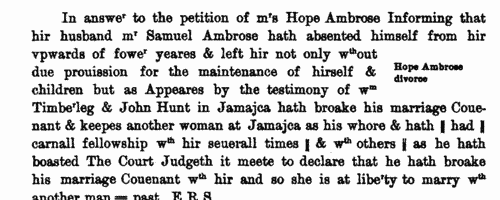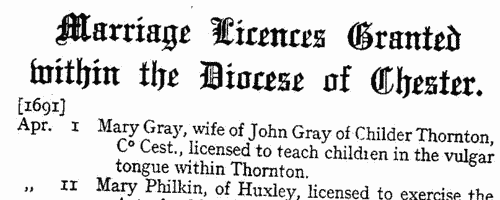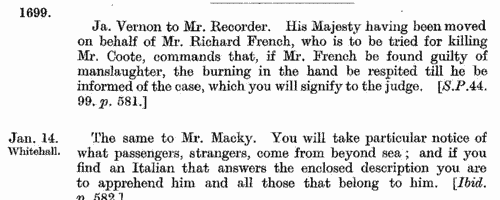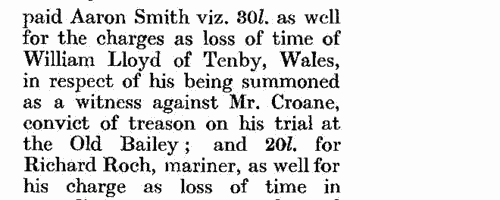Our indexes include entries for the spelling dodge. In the period you have requested, we have the following 316 records (displaying 31 to 40):
Lancashire and Cheshire Marriage Licences
(1680-1691)
Licences for intended marriages in Chester archdeaconry, which covered Cheshire and Lancashire south of the Ribble (by far the most populous part of that county) | Sample scan, click to enlarge

|
Massachusetts Criminals, Litigants, Lawyers and Jurors
(1673-1692)
The only surviving complete volume of the records of the courts held by the Governor and Assistants of the Colony of the Massachusetts Bay is for the period 1673 to 1692. It was transcribed by John Noble, and published by order of the Board of Aldermen of the City of Boston, New England, as County Commissioners of the County of Suffolk, Massachusetts. Under English law overseas colonies were generally deemed to fall under the jurisdiction of the Admiralty, and were subject to English law varied by local circumstances. These Courts of Assistants therefore also function as Courts of Admiralty; the courts had jurisiction over criminal cases and also in civil disputes between parties. In practice, many of the names that occur in the record are just those of the members of the grand jury and the lesser juries (appointed from among the adult male householders of the colony) before whom the cases were tried. | Sample scan, click to enlarge

|
House of Lords Proceedings
(1692-1693)
Private bills dealing with divorce, disputed and entailed estates: petitions, reports and commissions: naturalisation proceedings.
| Sample scan, click to enlarge

|
Official Papers
(1698)
The State Papers Domestic cover all manner of business relating to Britain, Ireland and the colonies, conducted in the office of the Secretary of State as well as other miscellaneous records. Includes lists of passes to travel abroad.
| Sample scan, click to enlarge

|
Lancashire and Cheshire Marriage Licences
(1691-1700)
Licences for intended marriages in Chester archdeaconry, which covered Cheshire and Lancashire south of the Ribble (by far the most populous part of that county). As shown in the sample scan, licences to practise midwifery and to teach are also included. The index covers bondsmen as well as brides and grooms. | Sample scan, click to enlarge

|
State Papers Domestic
(1699-1700)
The State Papers Domestic cover all manner of business relating to Britain, Ireland and the colonies, conducted in the office of the Secretary of State, as well as other miscellaneous records. 1 January 1699 to 31 March 1700.
| Sample scan, click to enlarge

|
Treasury Books
(1702)
Records of the Treasury administration in Britain, America and the colonies, for 1702. Also includes Treasury minutes for early 1691; secret service accounts from 1689 to 1702, and accounts of the Civil List (royal expenditure) and army debts that had accumulated by the time of the death of king William III (8 March 1702).
| Sample scan, click to enlarge

|
 Apprentices registered at Exeter in Devon
(1710-1712) Apprentices registered at Exeter in Devon
(1710-1712)
Apprenticeship indentures and clerks' articles were subject to a 6d or 12d per pound stamp duty: the registers of the payments usually give the master's trade, address, and occupation, and the apprentice's father's name and address, as well as details of the date and length of the apprenticeship. There are central registers for collections of the stamp duty in London, as well as returns from collectors in the provinces. These collectors generally received duty just from their own county, but sometimes from further afield. May 1710 to January 1712. (The sample entry shown on this scan is taken from a Shropshire return) | Sample scan, click to enlarge

|
 Apprentices registered at Exeter in Devon
(1712-1713) Apprentices registered at Exeter in Devon
(1712-1713)
Apprenticeship indentures and clerks' articles were subject to a 6d or 12d per pound stamp duty: the registers of the payments usually give the master's trade, address, and occupation, and the apprentice's father's name and address, as well as details of the date and length of the apprenticeship. There are central registers for collections of the stamp duty in London, as well as returns from collectors in the provinces. These collectors generally received duty just from their own county, but sometimes from further afield. January 1712 to June 1713. (The sample entry shown on this scan is taken from a Norfolk return) | Sample scan, click to enlarge

|
 Masters and Apprentices
(1714) Masters and Apprentices
(1714)
Apprenticeship indentures and clerks' articles were subject to a 6d or 12d per pound stamp duty: the registers of the payments usually give the master's trade, address, and occupation, and the apprentice's father's name and address, as well as details of the date and length of the apprenticeship. 12 April to 31 December 1714. | Sample scan, click to enlarge

|
Research your ancestry, family history, genealogy and one-name study by direct access to original records and archives indexed by surname.












